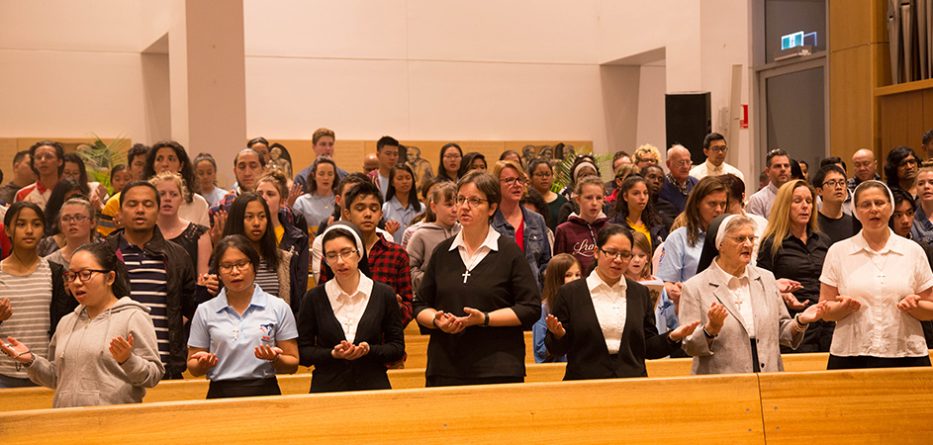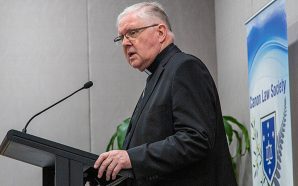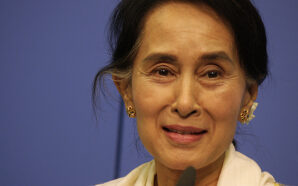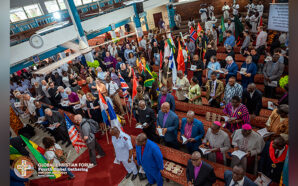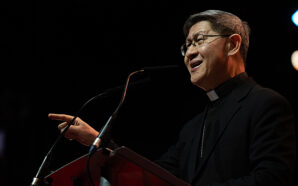This article was originally published in the May edition of the Melbourne Catholic Magazine.
When Catholic Christians pray together in their celebration of the liturgy—the Mass, for example—who is most important? You might answer, ‘the priest, because he prays the central words of the Eucharistic Prayer.’ Perhaps the reader is the most important because proclamation of the living word of God is central to all Christian worship. What about the cantor and other musicians? Aren’t they the most important because Scripture asks us to ‘sing psalms and hymns and inspired songs to God’ (Col 3:16)? Sacristans prepare what is necessary for the ritual, and altar servers facilitate the enactment of the rite, so perhaps they are the most indispensable.
In fact, there is but one indispensable participant in the celebration of the liturgy: the Body of Christ. This Body of Christ is made up of all the baptised. Through baptism, every single Christian becomes part of this Body and so ‘a kingdom of priests’ (1Pt 2:9; see also Rev 1:6). Of course, the ministerial priesthood and the priesthood of all believers are not exactly the same and differ ‘in essence’. But they are ‘nonetheless interrelated: each of them in its own special way is a sharing in the one priesthood of Christ’ (Lumen Gentium §10). A traditional way of understanding the difference is that ordained priests act in the person of Christ, who is the head of the Body of Christ. As such, they are leaders within the community and play an indispensable role in the celebration of the sacraments.
Judith Kubicki, Associate Professor of Theology at Fordham University, reminds us that ‘The presence of Christ … is symbolised within the assembly that gathers for worship’. The assembly, then, is indispensable to the celebration of the liturgy. In fact, though Church documents often distinguish between assembly and ordained ministers for the sake of articulating a theology of each, the assembly is comprised of everyone present, lay and ordained. The distinctions between Christians gathered for worship pertain to their role in the celebration, not their importance. All those gathered for Mass offer the sacrifice, for example, just in different ways according to their role and state in the Body of Christ. To make the case boldly, Pope Francis’s participation in the liturgy is no more important than yours.
It is easy to get bogged down in the complex theological distinctions between the ministerial and baptismal priesthood. Though such distinctions are essential, they move us away from the crux of the matter: it is the Body of Christ that celebrates the liturgy. If the liturgy is the ‘summit toward which the activity of the Church is directed’ and ‘the fount from which all the Church’s power flows’ (Sacrosanctum Concilium §10), then several crucial implications follow that have serious implications for what it means to be a Catholic Christian.
First, there is no liturgy that doesn’t involve the assembly—that is, the community of believers, the Body of Christ. All liturgy is the prayer of the entire Church. This reality is easy to discern when we think about the Mass; a community usually gathers to celebrate it and in the Eucharistic Prayer and General Intercessions the prayer of the local assembly is clearly connected to the universal Church. Sometimes gatherings for Mass are small, even just two people, but it is important to note that the Roman Missal makes no provision for a ‘private Mass’ but only for a ‘Mass with the participation of a single minister’ together with the priest. Even liturgies that seem private, like the first form of the sacrament of reconciliation where only the priest and the penitent are physically present, are celebrated in the name of and for the sake of the local community and indeed the entire Church.
Second, participation in the liturgy ‘by the Christian people … is their right and duty by reason of their baptism’ (SC §14). In baptism we have committed ourselves to the life of Christian faith. On one hand, this means we have the right to participate. On the other hand, this right is inseparable from our duty to take part in the liturgy. With these principles in mind, the idea of the ‘Sunday obligation’ makes a lot more sense.
Third, celebrating the liturgy well is essential. The right of the baptised to take part in the liturgy encompasses not only a right to be present, but also a right to participate in well-prepared and well-executed liturgy in which our involvement is facilitated. This means good preaching and presiding, well-trained liturgical ministers, worthy music led and sung well, and ongoing liturgical formation for the entire community. Helping communities improve their celebrations is central to the mission of the ACU Centre for Liturgy. We offer training and formation for all forms of liturgical ministry: lay and ordained, courses on particular liturgies, and academic courses in liturgy and sacraments.
Fourth, this right and duty to participate in our common worship comes with an obligation to take part in the singing, responses and actions that pertain to the assembly to the best of our ability. Not only this, but we must also be willing to step up and offer our talents in service to the community—the Body of Christ, the worshipping assembly—in one of the many lay ministries the liturgy requires. Indeed, ‘The faithful … should not refuse to serve the People of God in gladness whenever they are asked to perform some particular service or function in the celebration’ (General Instruction of the Roman Missal, 97).
Finally, and most importantly, you can’t be a Christian by yourself. The title of this article refers to Matthew 18:20, which says, ‘For where two or three meet in my name, I am there among them.’ Christianity endures only in the gathering of believers. We can also discern from Acts 2:42 that since the earliest times being Christian meant not only believing and being baptised, but also remaining ‘faithful to the teaching of the apostles, to the fellowship, to the breaking of the bread and to the prayers.’ Liturgy ‘makes the work of our redemption a present actuality’ (see SC §2). It is ‘the outstanding means whereby the faithful may express in their lives and manifest to others the mystery of Christ and the real nature of the true Church’ (SC §2). Being Christian means worshipping together.
The entire Body of Christ is the indispensable celebrant of the liturgy. Just as the ministerial priesthood’s participation is essential, though in a different way, so is the assembly’s. We might even dare to say that the normative way to take part in the liturgy is as part of the gathered assembly. After all, ‘In the restoration and promotion of the sacred liturgy, this full and active participation by all the people is the aim to be considered before all else’ (SC §14).
Jason McFarland MMus, PhD is Assistant Director of the ACU Centre for Liturgy and a lecturer in Liturgical Studies and Sacramental Theology in the ACU Faculty of Theology and Philosophy. The ACU Centre for Liturgy (CentreforLiturgy@acu.edu.au) works with Australian dioceses, parishes and deaneries to renew parish ministries and reignite fervour for service.
With thanks to Melbourne Catholic Magazine and the Archdiocese of Melbourne.




